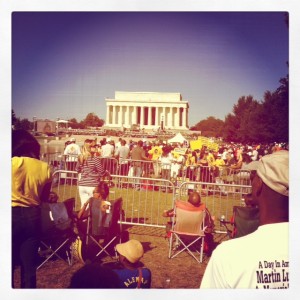 They didn’t have a literal hook, as they do at Harlem’s famous theater. Nor did people boo – except when speakers were cut off. And they were cut off constantly at the perhaps too-well-organized 50th anniversary March on Washington rally at the Lincoln Memorial Saturday.
They didn’t have a literal hook, as they do at Harlem’s famous theater. Nor did people boo – except when speakers were cut off. And they were cut off constantly at the perhaps too-well-organized 50th anniversary March on Washington rally at the Lincoln Memorial Saturday.
Someone along the line determined that the long list of speakers should only have two minutes each to speak and so that’s all they got. When time ran out, no matter where they were at in their speech, the microphone sound was cut, the band on hand played a snippet of instrumental soul music and it was all over.
It might have helped getting through a lot of activists and union leaders with varying issues to discuss. But when the same things happen to Julian Bond and the Rev. Jesse Jackson Sr., it just seemed absurd.
Even the lesser known names on the roster had their speeches cut at inopportune times. One challenged the crowd, “I have just one question to ask you…” Then, boom, time ran out and we never heard what it was. It was more mystifying than any question she could have ever posed.
Bond kidded when he hoped it didn’t count against his two minutes when he was brought on with two ridiculous introductions (the first didn’t say his name; the second said Bond was there “before Barack Obama” and pointed out he was born in America — implying what exactly?). But they did apparently cut into his time.
In a roster of speeches that built on the legacy of the moment — with lots of repetition, call and response and invoking of Negro spirituals, cutting speakers off or fading them down robbed each of them of climactic finishes. Even the Congress will remind people they have so many seconds left (none were allowed here to yield the balance of their time to the next speaker).
Worse, they couldn’t let their words resonate over the mall, which wasn’t quite as full as 1953 but was impressively lined by tens of thousands. Instead, they had to rush, tumbling over words in an effort to complete before time ran out. Jackson had a number of those good rhymes and wordplay that are worthy of free verse, including one that suggested switching from “Stop and frisk” to “stop and educate” and so forth.
When he read a litany of issues that still needed attention, with an updated phrase from King, “keep dreaming,” it sounded, with the rush more like he was saying something more dismissive: “dream on.”
Unless I missed something, the only music I heard performed was by someone who was also at the ’63 rally. Not Bob Dylan, or Joan Baez, or Peter or Paul (Mary, R.I.P.). It was Tony Bennett, who performed with a couple of backing musicians as if the was getting the chance never got 50 years ago, crooning a pair of songs of that vintage, “Watch What Happened” and “They All Laughed” (“ho, ho, ho, who’s got the last laugh now?”) that were topped by a coda of “I Left My Heart in San Francisco” (because legally, he apparently can’t perform anywhere without doing his signature song).
All of those who were there in 1963 were sure to mention it in 2013, as did former Speaker of the House Nancy Pelosi, who probably wasn’t wearing the same kind of pearls then.
When the only surviving speaker from ’63 came on, though, Tom Joyner, who had taken over announcing, made sure to note that the music wouldn’t cut him off. It was now Congressman John Lewis, whose strong remarks, without the boundary of the time limits, didn’t turn out to be very long anyway.